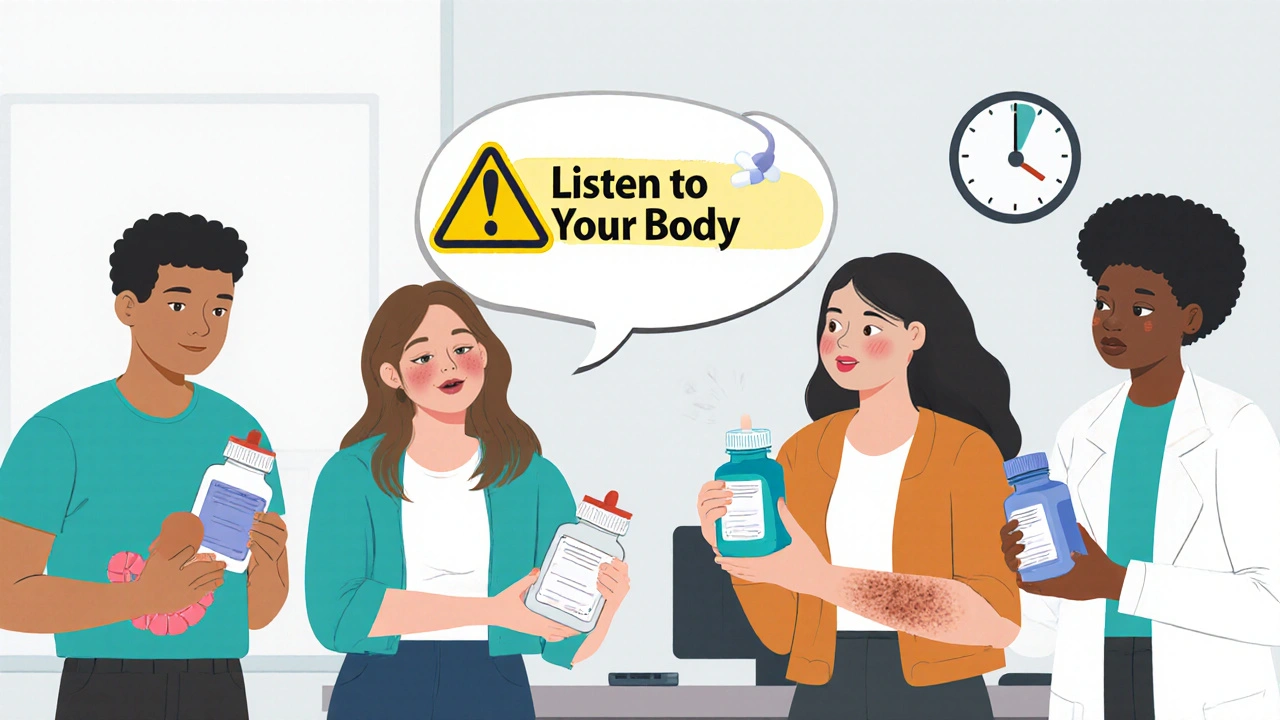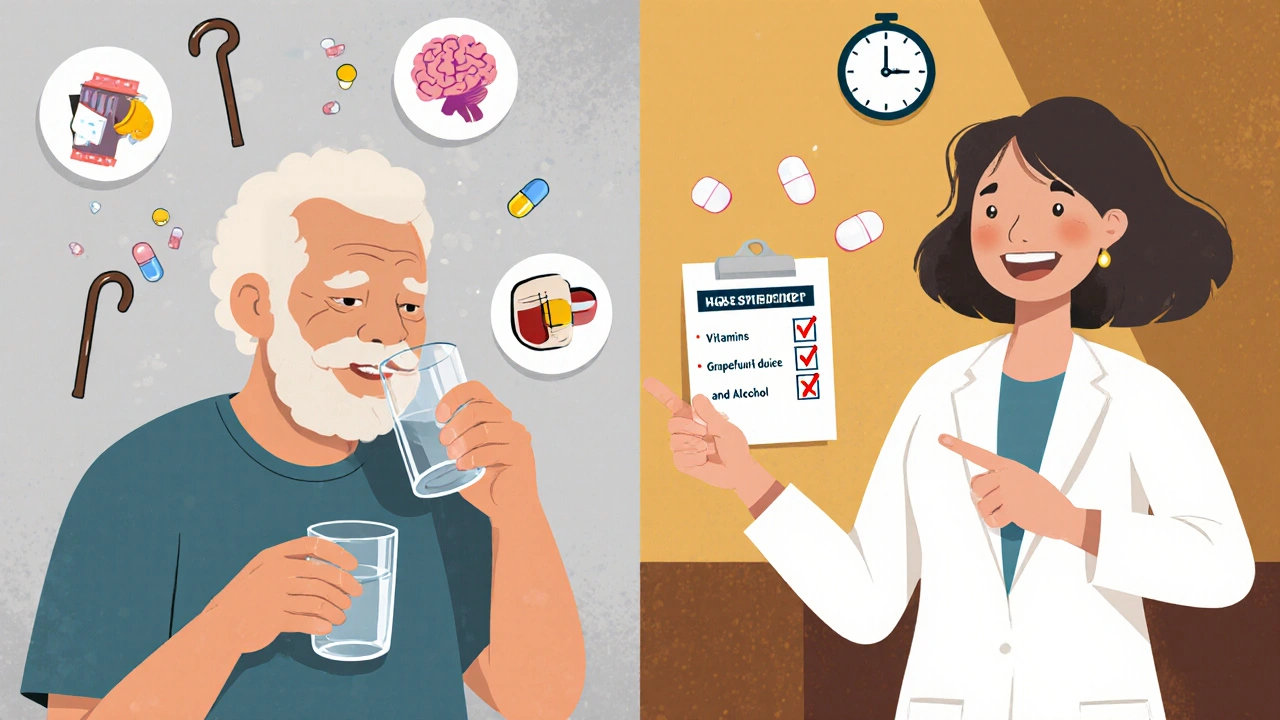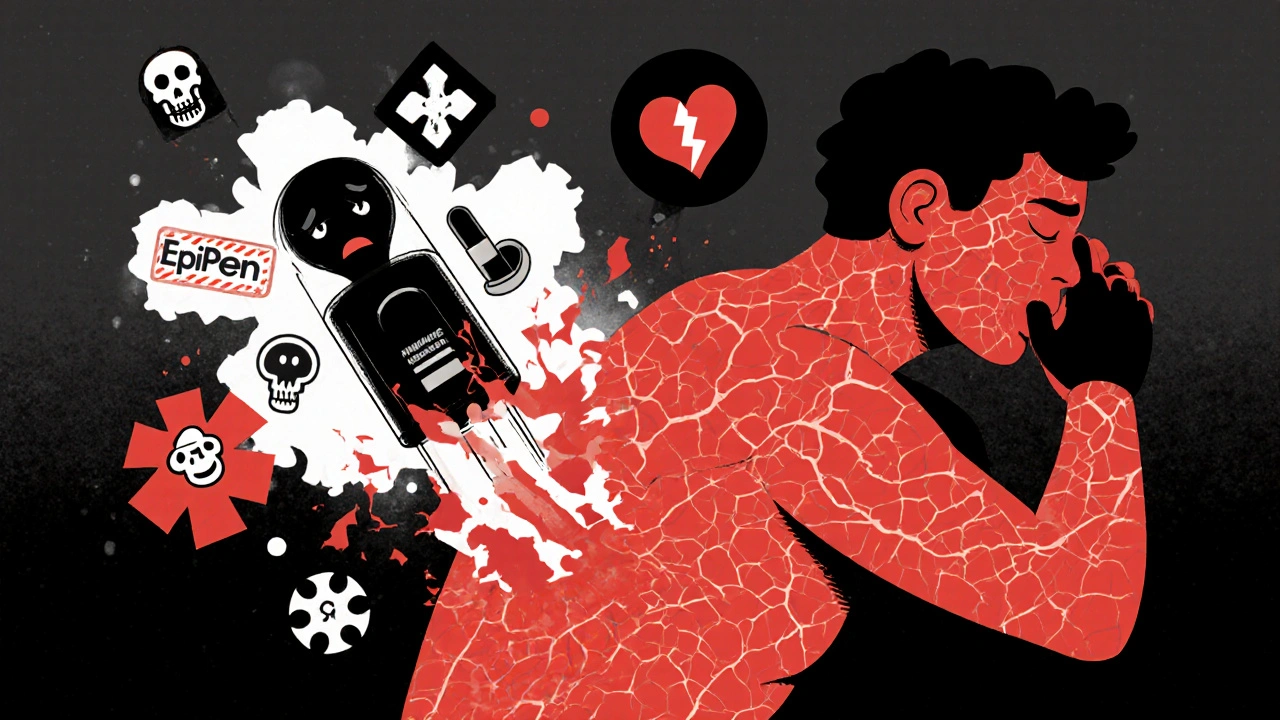Medication Side Effects: Common Reactions and When to Seek Help
 Nov, 22 2025
Nov, 22 2025
Almost everyone takes medication at some point - whether it’s a daily pill for high blood pressure, an antibiotic for an infection, or a simple pain reliever for a headache. But what happens when that pill doesn’t just help - it hurts? Side effects are common, but not all of them are harmless. Knowing which reactions are normal and which need immediate attention can make all the difference.
What Counts as a Side Effect?
A side effect, or adverse drug reaction (ADR), is any unwanted or harmful response to a medicine taken at the right dose. These aren’t mistakes - they’re known risks built into how drugs work. About 75% of side effects are predictable and tied to the drug’s main action. For example, an antihistamine like diphenhydramine (Benadryl) causes drowsiness because it blocks acetylcholine, a brain chemical that keeps you alert. That’s a Type A reaction: expected, dose-related, and usually mild. The other 20-25% are Type B reactions. These are unpredictable, often immune-driven, and not related to how the drug is supposed to work. Think severe rashes, swelling, or even organ damage. These are rare but dangerous. The thalidomide disaster in the 1960s, which caused thousands of birth defects, changed drug safety forever. Today, every new medication must prove it’s both safe and effective before it hits the market.Most Common Side Effects You’ll Actually Experience
You’re not imagining things if you feel a bit off after starting a new pill. The most frequent side effects are simple, annoying, and often temporary:- Nausea - happens with antibiotics, painkillers, even antidepressants. It’s often because the drug irritates your stomach lining.
- Constipation or diarrhea - common with opioids, iron pills, and some blood pressure meds like calcium channel blockers.
- Drowsiness or fatigue - seen with antihistamines, benzodiazepines (like Xanax), and some antidepressants. This isn’t just being tired - it’s a direct effect on your nervous system.
- Headache - surprisingly common. Even medications meant to treat headaches can cause them as a rebound effect.
- Dry mouth - a classic side effect of anticholinergic drugs, including many allergy, depression, and bladder medications.
- Rash or itching - could be harmless, or it could be the start of something serious.
When a Side Effect Isn’t Just Annoying - It’s Dangerous
Not every weird feeling means you should panic. But some reactions are red flags that need urgent care. The FDA defines a serious side effect as one that causes:- Death
- Life-threatening conditions
- Hospitalization
- Permanent damage
- Birth defects
- Anaphylaxis - sudden swelling of the lips, tongue, or throat; trouble breathing; hives; rapid pulse. This can kill in minutes. Call emergency services immediately.
- Stevens-Johnson Syndrome (SJS) or Toxic Epidermal Necrolysis (TEN) - a painful, spreading rash that turns into blisters and skin peeling, like a severe burn. Often starts with fever and flu-like symptoms before the skin breaks down. Requires hospitalization.
- DRESS syndrome - fever, swollen lymph nodes, rash, and internal organ damage (liver, kidneys, lungs). Often appears weeks after starting the drug.
- Internal bleeding - unexplained bruising, blood in stool or urine, vomiting blood. Common with blood thinners like warfarin or NSAIDs like ibuprofen.
- Abnormal heart rhythms - palpitations, dizziness, fainting. Can happen with some antibiotics, antidepressants, or even certain allergy meds.
- Suicidal thoughts - especially in young adults starting antidepressants. This risk is real and must be monitored closely.

Special Risks for Older Adults and People on Multiple Drugs
If you’re over 65, you’re at higher risk. The 2021 National Ambulatory Medical Care Survey found that people in this group experience adverse reactions at more than three times the rate of those aged 45-64. Why?- Multiple medications (polypharmacy) - the average senior takes five or more prescriptions.
- Slower metabolism - kidneys and liver don’t clear drugs as quickly.
- Increased sensitivity - even small doses can have big effects.
Drug Interactions: The Hidden Cause of Side Effects
Sometimes, it’s not the drug itself - it’s what you mix it with.- Alcohol + opioids - can cause respiratory failure. This combination has killed thousands.
- Grapefruit juice + statins or blood pressure meds - grapefruit blocks enzymes that break down these drugs, causing toxic levels to build up in your blood.
- NSAIDs + blood thinners - increases bleeding risk dramatically.
- Antibiotics + birth control - some (like rifampin) can reduce effectiveness.
What to Do When You Notice a Side Effect
Don’t just power through. Don’t quit cold turkey. Here’s what works:- Track it - Write down when the symptom started, how bad it is (1-10 scale), and if anything makes it better or worse.
- Don’t stop the drug - Unless it’s an emergency, stopping suddenly can be dangerous. Some meds cause withdrawal symptoms or rebound effects.
- Call your doctor - If it’s persistent, worsening, or affecting your daily life (sleep, work, mood), talk to them. They may adjust the dose, switch the drug, or add a counter-treatment (like a stool softener for constipation).
- Use reliable sources - The National Library of Medicine’s drug database is free and trustworthy. Avoid random websites or social media advice.

How and Why You Should Report Side Effects
Most side effects go unreported. Studies show less than 5% of all adverse reactions make it to official systems. That’s a problem - because without data, regulators can’t spot new dangers. In the U.S., the FDA runs MedWatch. In New Zealand, it’s the Centre for Adverse Reactions Monitoring (CARM). In the UK, it’s the Yellow Card Scheme. These systems let patients and doctors report reactions anonymously. Why report?- It helps protect others - if 10 people report the same rare reaction, the FDA might add a warning or even pull the drug.
- It improves future prescribing - your report could help your doctor choose a safer option next time.
- It’s easy - most reports take under 10 minutes.
What About Cancer Drugs and Radiation?
Cancer treatments are harsh because they don’t just target cancer cells - they hit fast-growing healthy cells too. That’s why side effects like hair loss, nausea, and fatigue are so common.- Chemotherapy - causes fatigue, low blood counts, hair loss (usually temporary), nausea, and increased infection risk.
- Radiation - side effects depend on the area treated. Head/neck radiation often causes dry mouth; abdominal radiation causes diarrhea; pelvic radiation can lead to infertility or early menopause.
Bottom Line: Stay Informed, Stay Alert
Side effects are part of modern medicine. But they don’t have to control your life. Knowing what’s normal, recognizing danger signs, and speaking up when something feels off can save your health - or even your life. Start by reading the patient information sheet that comes with your prescription. Keep a list of all your meds and supplements. Talk to your pharmacist - they’re trained to spot interactions. And never ignore a new symptom that doesn’t go away. Your body knows when something’s wrong. Listen to it.Are all medication side effects dangerous?
No. Most side effects are mild and temporary - like nausea, drowsiness, or dry mouth. These are common and often fade as your body adjusts. But if a side effect is new, worsening, or affects your ability to function, it’s worth checking with your doctor. Not all side effects are dangerous, but all should be monitored.
Can over-the-counter drugs have serious side effects?
Absolutely. Many people assume OTC means safe, but that’s not true. NSAIDs like ibuprofen and naproxen can cause stomach bleeding, kidney damage, or high blood pressure with long-term use. Antihistamines like Benadryl can cause confusion and falls in older adults. Even acetaminophen (Tylenol), if taken in excess, can cause severe liver damage. Always follow the label and don’t combine multiple products with the same active ingredient.
How long do medication side effects last?
It depends. Mild side effects like dizziness or upset stomach often go away within a few days to weeks as your body adjusts. But some - like weight gain from antidepressants or nerve damage from certain chemo drugs - can last longer or become permanent. If a side effect hasn’t improved after two weeks, or gets worse, contact your doctor. Don’t assume it’ll just go away.
Should I stop taking my medicine if I have side effects?
Only if it’s a medical emergency - like trouble breathing or chest pain. Otherwise, never stop a prescription drug without talking to your doctor. Stopping suddenly can cause withdrawal symptoms, rebound illness, or make your condition worse. For example, quitting blood pressure meds abruptly can cause a dangerous spike in blood pressure. Your doctor can help you taper off safely or switch to a better option.
Why do some people get side effects and others don’t?
Genetics, age, liver and kidney function, other medications, and even diet play a role. Some people metabolize drugs slowly, leading to higher levels in the blood. Others have immune systems that react strongly to certain chemicals. Women, older adults, and people with chronic diseases are more likely to experience side effects. It’s not about being “sensitive” - it’s about biology.
Can I report a side effect even if I’m not sure it was caused by the drug?
Yes. Reporting systems are designed to catch patterns - even if you’re uncertain. If you took a new drug and then developed a rash, fever, or unusual fatigue, it’s worth reporting. Regulators look at thousands of reports to spot trends. One report might not change anything, but 50 similar reports can lead to a safety alert or drug recall. Your report matters.

Danny Nicholls
November 22, 2025 AT 20:22Just started taking that new blood pressure med and my mouth feels like the Sahara 😅
Thought I was dehydrated but turns out it's a known side effect. Glad I found this post!
Robin Johnson
November 24, 2025 AT 08:01People underestimate OTC drugs. I took ibuprofen for a week straight for a backache and ended up in the ER with a bleed. Never again. Read the damn label.
Ravi Kumar Gupta
November 25, 2025 AT 20:42In India, we call this 'dawa ka asar' - the effect of the medicine. But here’s the thing: no one tells you what to expect. My aunt took antibiotics for a cold and got a full-body rash. Took her 3 months to recover. Doctors just say 'it happens'. But it shouldn’t just 'happen' - we need better counseling.
Pharmacies hand out pills like candy. No one asks if you're on other meds. No one checks your liver. We need a system like the UK’s Yellow Card - simple, anonymous, and mandatory. This isn’t just about safety - it’s about dignity.
And don’t get me started on how elders are given 8 different pills without anyone explaining interactions. My grandfather took Benadryl for sleep and started hallucinating. We thought it was dementia. Turns out, it was the antihistamine. He’s fine now, but he almost lost a year of his life.
Let’s stop treating medication like a magic bullet. It’s chemistry. It’s biology. It’s responsibility. And we’re all just trying to survive it.
Rahul Kanakarajan
November 27, 2025 AT 17:19Ugh. Another ‘meds are fine’ article. Newsflash: Big Pharma doesn’t care if you get a rash or brain fog. They just need you to keep buying. They bury the real risks in 12-point font while marketing the hell out of the benefits. And don’t even get me started on how they pay doctors to prescribe.
You think your doctor knows all the interactions? Nah. They get a 7-minute visit. You’re just another number. The only person who cares about your side effects is YOU. So track it. Log it. Don’t trust anyone. Especially not the pamphlet that says ‘mild drowsiness’ - that’s code for ‘you’ll be useless for 6 hours’.
And yeah, reporting? It’s pointless. I reported a reaction to a statin. Nothing happened. They got 200 more reports the next week. Still selling it. So why bother?
New Yorkers
November 28, 2025 AT 23:41Listen. We live in a society that treats medicine like a Netflix subscription - just click ‘play’ and hope it works. But your body isn’t an algorithm. It’s a temple made of blood, nerves, and ancient evolutionary baggage. That pill you popped? It’s not a fix - it’s a negotiation. And sometimes, your body says ‘no’.
Side effects aren’t bugs. They’re features of a system designed to survive, not to please Big Pharma’s quarterly earnings report. That dry mouth? Your body’s trying to conserve water because the drug is hijacking your autonomic nervous system. That fatigue? Your mitochondria are screaming.
Stop blaming yourself. Stop ignoring symptoms. And stop trusting the label. The real truth? You’re the expert on your own body. The doctor? Just a guide with a degree.
David Cunningham
November 30, 2025 AT 15:13Been on antidepressants for 5 years. The drowsiness faded after a month, but the dry mouth? Still there. I keep a water bottle taped to my desk now. Also, grapefruit juice? Never again. Took my cholesterol med with it once. Felt like my heart was trying to escape my chest. Weird stuff.
Side effects suck, but they’re just part of the deal. You weigh the pros and cons. My anxiety was worse than any dry mouth.
luke young
December 1, 2025 AT 19:27Great breakdown. I especially appreciate the note about not stopping meds cold turkey - I did that once with my anxiety med and ended up with rebound panic attacks for weeks. Lesson learned.
Also, love that you mentioned talking to pharmacists. They’re the unsung heroes. My pharmacist caught a dangerous interaction between my supplement and my blood thinner. Saved me.
Jessica Correa
December 2, 2025 AT 01:18My mom took that new diabetes drug and got a rash that looked like sunburn but it was everywhere
She didn’t tell anyone for 3 days because she thought it was just heat
Turned out it was DRESS syndrome
She was in the hospital for 10 days
Now she reports every little thing
Don’t be like my mom
manish chaturvedi
December 3, 2025 AT 19:14As a healthcare worker in rural India, I see this daily. Patients take antibiotics from street vendors. They mix Ayurvedic herbs with Western pills. No one records what they take. Side effects are dismissed as ‘bad karma’ or ‘weak constitution’.
We need community education - not just pamphlets, but village meetings, radio broadcasts, maybe even WhatsApp groups in local languages. Knowledge must be accessible, not just available.
And yes, reporting matters. One report from a village nurse about a new seizure pattern linked to a common antimalarial led to a nationwide alert. Change starts small.
Nikhil Chaurasia
December 5, 2025 AT 18:39I just wanted to say thank you for writing this. I’ve been afraid to speak up about my side effects because I didn’t want to seem ‘difficult’. But reading this made me realize - it’s not being difficult. It’s being smart.
I’m going to start tracking mine now. And I’ll report. Even if it feels small.
Holly Schumacher
December 7, 2025 AT 01:07Correction: The article says ‘75% of side effects are predictable’ - that’s misleading. The FDA defines ‘predictable’ as pharmacologically expected, not clinically harmless. Many ‘predictable’ side effects are debilitating - like weight gain from antipsychotics or sexual dysfunction from SSRIs. These are not ‘mild’ - they’re life-altering. And yet, they’re still labeled ‘common’ and brushed off.
Also, ‘St. John’s Wort interferes with birth control’ - that’s an understatement. It reduces serum concentrations of ethinyl estradiol by up to 50%. That’s not ‘maybe’ - that’s a guaranteed risk. People get pregnant because they think ‘natural’ means ‘safe’. It doesn’t. Ever.
And why is no one talking about how antidepressants increase suicidal ideation in teens? This article mentions it in a footnote. It should be in bold. In caps. In neon.